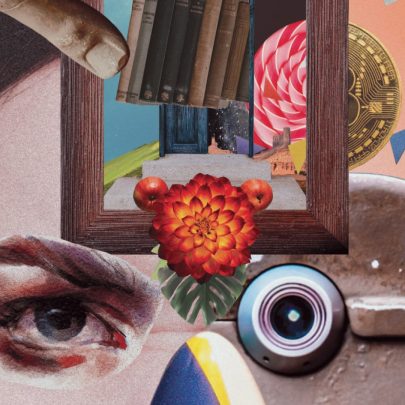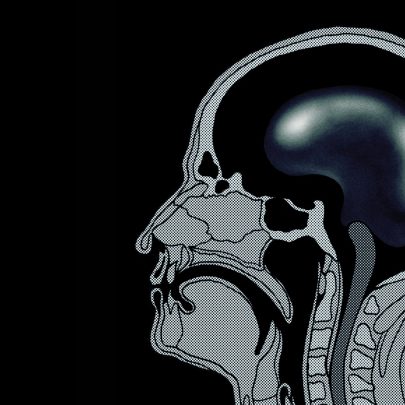Sep 6, 2016 Schools
Kapa haka is compulsory at Te Kura Kaupapa Maori a Rohe o Mangere, where the thumps of stamping feet echo through the classrooms. Metro joined students as they prepared to compete on the national stage.
This article was first published in the July 2016 issue of Metro. Photos by Stephen Langon. Above: Ruhia Henare-Samuels.
WHERE BETTER TO start than with the girl who stands front and centre. Ruhia Henare-Samuels, named after her paternal great-grandmother and a child of Ngati Raukawa ki Tainui, Ngati Awa, Ngapuhi and Tuhoe, is 17 years old, supremely tall, with long hair that trails down her back in a plait she shakes out and plaits again, shakes out and plaits again.
This girl calls kapa haka her life. Most lunchtimes, she leads her peers as they practise their routines, and with her complete lack of fuss or instruction, she inspires in them something like unity. As she looks out past everything that’s concrete and she starts to sway, it’s as though she’s whispering to them, quiet now, begin.
Later, someone refers to her as Ruhia the Motivator, and she deserves a sort of title, grand like this. She says she has to be the boss because she is the oldest of five kids: “I have to yell my lungs out because they don’t listen!” That’s why, she says, she always complains of a sore throat, when really she speaks in a whisper so low it’s impossible to hear her without leaning in. In song, she closes her eyes for long stretches as she sings up to her ancestors, her eyelids dotted with dark freckles. Her karakia sounds like inside there lives a kuia, and yet to look at, she’s a half breath away from womanhood.
Any day now, Ruhia Henare-Samuels will represent her school, Te Kura Kaupapa Maori a Rohe o Mangere, in the Nga Manu Korero speech competition finals, where she will speak in her native tongue for 12 minutes about te reo and whether it will survive the next 100 years.
“I reckon it’s gonna die,” she says. She could cry at any moment. “Kapa haka will go down the drain, too. Instead, everyone will be singing songs like ‘Watch Me Whip.’”
Manurewa is home to our hero. There, she sees poverty all the time and she sprinkles spare change into outstretched hands as she comes out of the dairy. As she wanders away, she wonders whose fault it is that there are beggars on the streets. Is it theirs or someone else’s? She always thinks about that.
When she stands behind the boys during haka, like the rest of them she calls out a challenge to Prime Minister John Key written by her teacher: te kakenga a Nga Hau Mangere o Hoturoa, the lazy winds of Mangere are rising, an anger is building. “Agh, John Key,” she says. “There’s people that’s living in poverty and are sleeping in cars and him saying he doesn’t notice it?” That’s why, she says, “we do most of our haka to him”. E, Ki! E, Ki! E, Hone Ki! Kai a te ahi! Kai a te kuri! He kai ma oku toki e! (“Is that right, John Key! You will be food for my fire! Food for my dog! Food for me!”) Some of the kids here say they don’t feel noticed, but during kapa haka they feel immensely powerful.
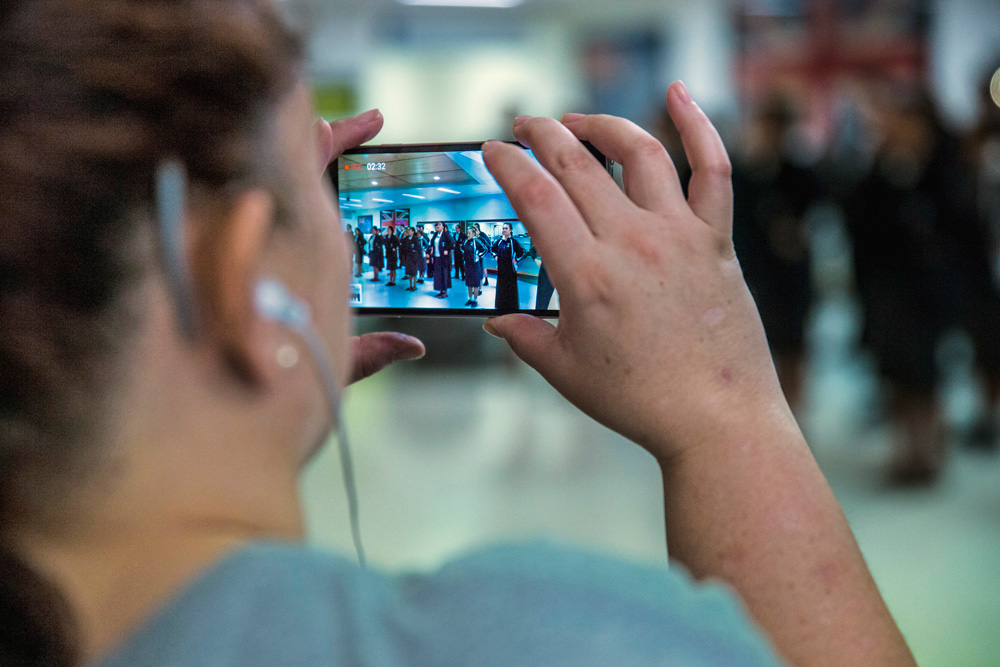
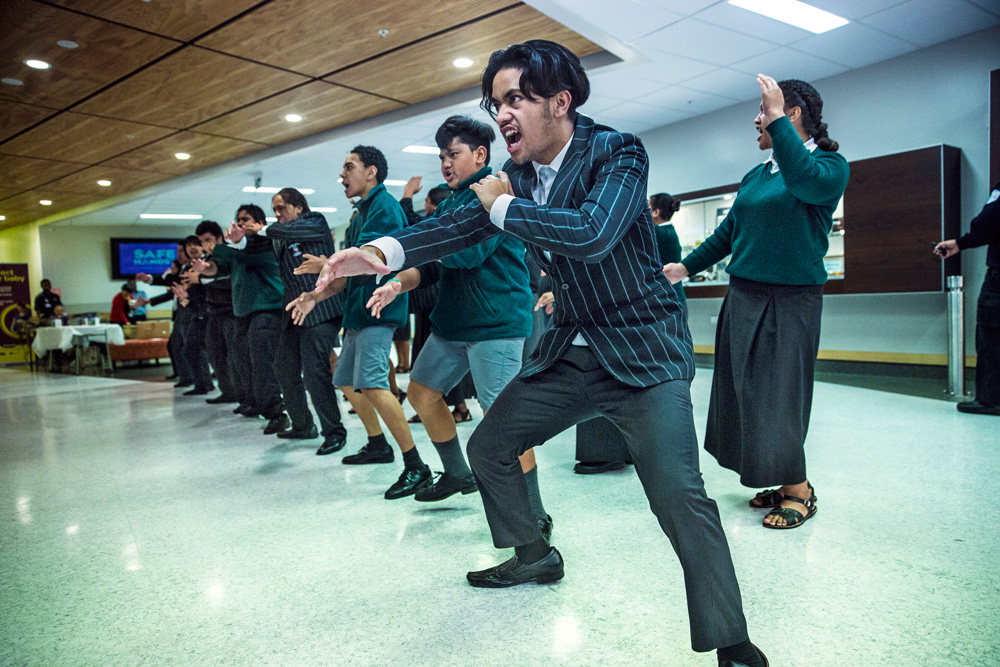
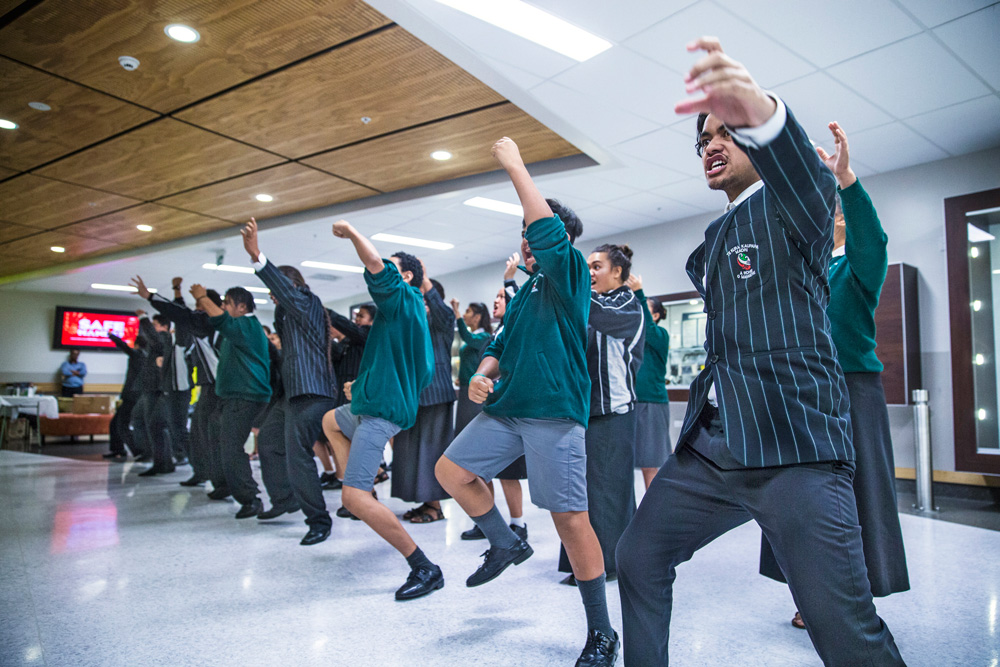
Above: Performing at Middlemore Hospital, Wakawiti Paratene in the foreground.
It is said by the haka master, Henare Teowai, that in kapa haka the whole body should speak, kia korero te katoa o te tinana, and these kids display that during each of the three disciplines: waiata a ringa, haka and poi. During haka, they are warriors, eyes wide, tongues out, hissing like hot onto cold. “Not necessarily to scare people,” says Ruhia. “It’s to show we are not happy with what is happening in our community.” When performing the poi, the girls imagine a lover and they giggle and their hips shake. “In kapa haka, you have to be like Shortland Street and change character,” Ruhia says.
Everyone at this school can sing. During waiata a ringa, the boys at the back listen to their sisters, and Wakawiti Paratene says “it feels like a heart beating”.
Te Kura Kaupapa Maori a Rohe o Mangere is a full-immersion Maori school with a roll of 240 students. It starts at Year 1 and goes all the way, and here kapa haka is a compulsory subject from day dot. As proof, you can hear a never-ending thump of children’s feet echo through the classrooms, and the boredom of practice with only the teacher watching that sounds in their voices as they repeat songs they more than know.
When the kapa haka group travels to Middlemore Hospital to perform in the entranceway for 30 minutes, their sound is so powerful, it must echo as a gift into every ward. There’s nothing like an audience to give their routines a good dusting off, and they puff out their chests and roar with a total lack of abandon that challenges the very thing that makes them teenagers.
Principal Lucy Te Moana speaks about kapa haka with pride in her kids. She says it’s important that every one of them performs to some level “because kapa haka is their culture. It helps them learn who they are, their history. It grows leaders and writers and the kids shine when they do it. They love it.”
“We’ve been doing it for forever,” says the principal’s son Te Ruki, 16. “Since we were in nappies.”
Most already know the songs when they arrive to start school. “We’ve been doing it for forever,” says the principal’s son Te Ruki, 16. “Since we were in nappies.”
Outside of the kapa haka that is built into the school’s curriculum, a dozen students gather to practise away their lunch breaks in anticipation of Te Wananga o Aotearoa Kapa Haka Super 12s, a fiercely fought national competition that will take place on July 9 as part of the Matariki Festival. The event is in its sixth year, but it’s the first time the school has entered a team. Changes in the competition mean this year school teams will compete against adults, and even though these kids would like to win first prize ($12,000), as much as anything they are excited about performing on stage at The Cloud on Queens Wharf. “It’ll be mean as,” says Ruhia.
They are not sure who will take them yet; hopefully they will go in the school van, hopefully driven by Povey Moses who the kids say has been someone they turn to when rehearsals go awry. He’s good at kapa haka, says Ruhia. “He’s creative as, but we don’t want to have to ask him all the time, he’s busy.”
Each day the bell rings for lunch and they find an empty classroom to choreograph their moves, brainstorm words for their songs and haka. Sometimes a teacher will call in on them, often not.
“No one is tutoring them, eh,” says Moses, a 32-year-old media studies and te reo rangatira teacher, two years into his tenure at the school. “I’m not tutoring them. [It was] mentioned at a meeting, who is gonna tutor the kids? I said, I’ve got a baby son.” His school days can no longer extend through to nights and weekends now that he has his own little one, and he lists the names of other teachers who are already devoting much of their free time to the school. Though some of the teachers have said they will keep an eye on the group, Moses says, “these kids love kapa haka that much, they teach themselves”.
“Who wants to teach at a low-decile school in South Auckland?” says Moses, and he answers the question himself: “No one.” Not exactly true, and he knows he is hyperbolising, but he says that often he feels like he and his colleagues are on this ride with scant support from the outside.
Hit the news button on Google after entering the search term “Mangere” and you soon get a feel for the outsiders’ view of the place. A fatal shooting, a story about homelessness, a high-risk sex offender placed metres away from a Mangere school, a newborn given shelter at the local marae. It mightn’t make the list as a Sunday drive destination and yet missing out on these kids means the joke is on us; nothing comes close to their company, watching them perform.
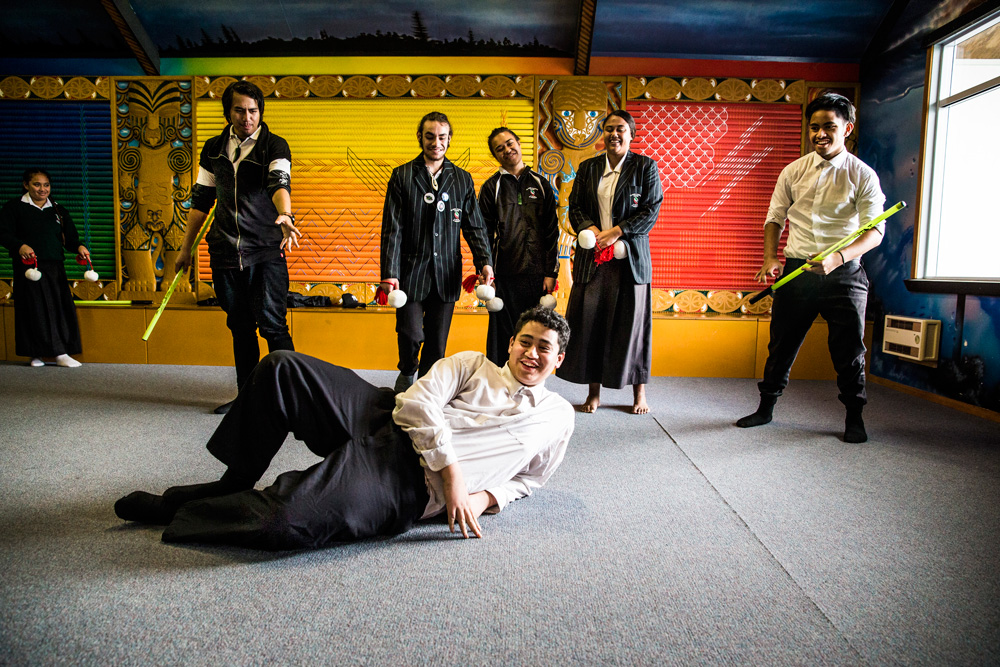
Of course, there’s Ruhia, but there are others, too. There’s Henly, this immense kid, who hides down the back — “I’ve just rejoined the group, Miss, my mum’s sick” — who lolls on the ground, who has to be wooed onto the stage, whose strength when he performs is terrifying and brilliant. There’s Hautu the joker, pulling his pants up, mucking around, then exploding into song with his perfect sound. There’s Te Ruki, the gentle one, who wants to be part of the group but lets himself only as far as the edge of it. There’s Wakawiti, who plays down his role and calls it “helping out with the boys”, who wants to be Prime Minister, who took up kapa haka after watching his father perform, a father who now lies buried back home in Taranaki. And there’s Gailen, named after his uncle who died at birth, who thinks about his uncle as he performs the haka ,“about how life would be different if he was alive”.
“If you’ve got anger inside you, you use it in the haka, and if you look at all the happiness life has, you use it in the poi.”
Pikirangi is the girl who looks into the eyes of the crowd to make sure they are smiling back at her before she can rise up and out beyond it all, reassured, who wants to study to become an actor at a place her teacher told her about despite never having been to a play. And there’s dear Anamoerangi, who hides half her face under her scarf, who prefers song to speaking and says, “I can’t live without kapa haka”, who would like to teach at a school in her hometown, Taumarunui, even though Opotoki is her favourite place, because “the school where I was raised is not really doing well and I want to help”.
Before they go on stage, they reach into themselves and access things they have felt in their short lives. “If you’ve got anger inside you, you use it in the haka,” says Pikirangi, “and if you look at all the happiness life has, you use it in the poi.”
At the moment, there are constant whispers among them about Te Puea Marae, just down the road from this school, the place that has reached out to care for its people while the government stutters. The students have been asking to go there and sing and Ruhia says some will take cans of food from their own hungry cupboards. “Lately there’s a lot of people staying at the maraes,” says Pikirangi, “it makes us wanna change things.” She says people think teenagers don’t worry about money, “but our whole school worries about financial things, including the teachers; they worry for us”.
Here at kapa haka practice, the Super 12 kids appear used to making things work with little or no money. “We just have to use the resources at this school and that’s, like, pretty hard, because we need extra stuff.” It’s the closest Ruhia comes to complaining. Any possibility of budget that will allow them to buy props and costumes will be minimal. Some teachers have said they will dig out old uniforms for the students to wear, and optimistically they say this could work, perhaps as a nod to kapa haka through the ages.
This competition is all about being modern and innovative within the framework of traditional kapa haka. In terms of other teams and their budgets, event producer Mikki-tae Tapara says most get “quite a bit” of support from their communities. “It’s a nice prize pool if they are successful, but they don’t have to have the dollars, they just have to have the skills and creativity.”
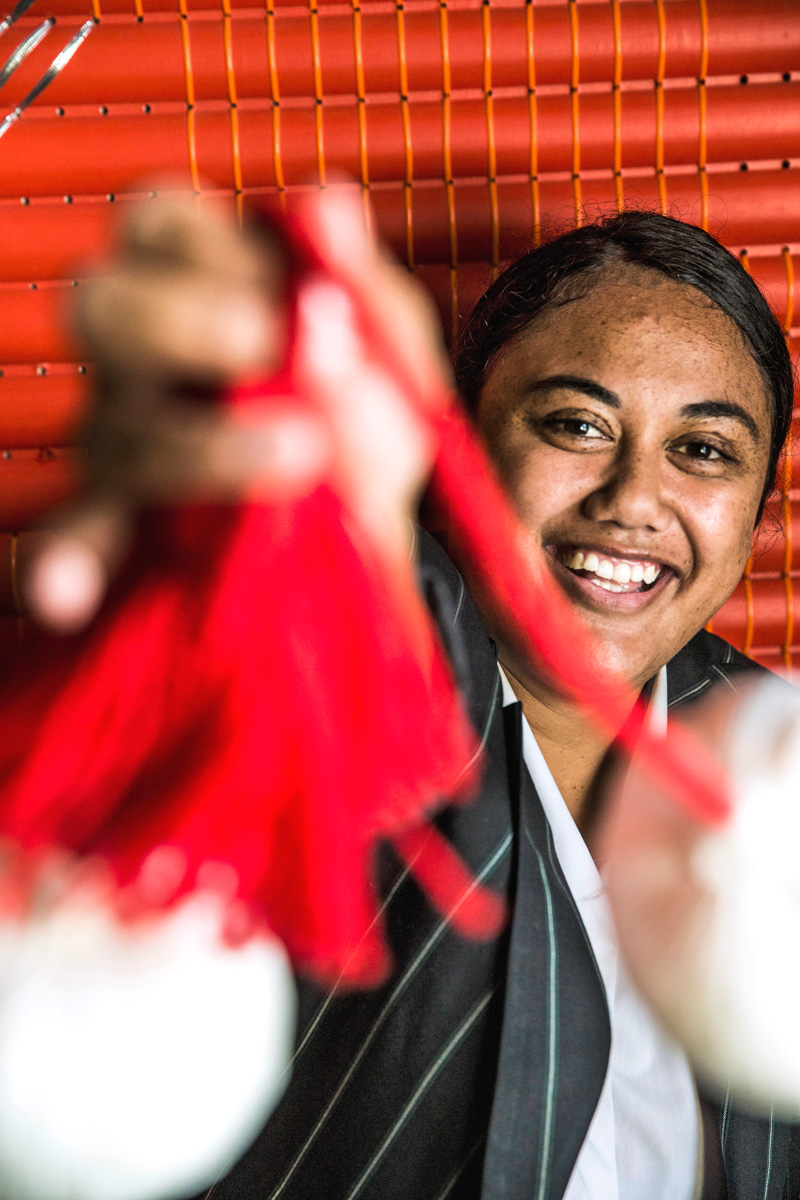
Past entrants have dressed as ninjas and animated Disney characters, and the winning team from Whangarei last year themed its performance around the flag debate. Mikki-tae says that while traditional kapa haka will always hold the prestige and mana within the Maori community — “it’s the big mama” — the Super 12s could be viewed as a fusion of old meets new, “the street version of the ballet. It’s a breakaway of tradition for the rangatahi, so they can have a laugh and play. We don’t do that enough.”
And indeed, the kids of the Mangere kura seem to be having fun as they work out their routine. At one point there are whispers that four members of the team have let the school down while on a class trip and Ruhia worries they will be banned from the group, but on they go.
They watch past entrants on YouTube — “Whoa, they are mean as,” says Ruhia, “how do they come up with this kind of stuff?” It’s as though they are intimidated by the sophistication they see in others and don’t believe they possess it themselves. They talk about how a whole group did their routine in high heels. High heels! Someone suggests they use glitter on their bodies, but they wonder aloud if there will be money to buy it.
When they fool around and mimic the kind of dance they see on American pop videos, they show a natural ability to move, but the thought of transferring any of that material to the traditional kapa haka they have been raised on seems inconceivable. That’s just not how it’s done. “We’ve never done anything like this in our lives,” says Te Ruki. Instead, they decide to use the tired old song “Lean on Me” as a background to their waiata, and even picking the tempo up on that has them twinkling.
At times they come unstuck, without help or hope of it, and Ruhia the Motivator wanders around, forlorn, before gathering them back in again. Wakawiti stands at the whiteboard and patiently writes up new lyrics as they come. Slowly, a story comes together for their haka, about the harvesting of kumara and potatoes around the time of Matariki, about how it gathers them all together as one, and Ruhia finds her fire again. “You’d be surprised how fast we can learn songs,” she says, “we can write a new one and learn it that day, that’s how keen everyone is to do Super 12s.”
Maybe they won’t be the best when they arrive at Queens Wharf to compete that day, but try and find another group that will have worked harder under these circumstances. “The odds are stacked against our kids,” Moses says. “If they can finish school they are survivors. If they can finish school and go to uni, they are doing really, really well.”
“They can escape from whatever they are going through at the moment, through all of their trials; they can use it to get away. When you see them on stage, they are so free.”
He says kapa haka has elevated status at the school partly because it transports them out of their worlds. “It’s escapism. They can escape from whatever they are going through at the moment, through all of their trials; they can use it to get away. When you see them on stage, they are so free.”
In 2008, PhD student Paul Whitinui did a thesis on the topic of kapa haka and its efficacy in schools, and it proved all the things this kura believes to be true. He found it has a positive impact on Maori participation, that students who are involved in kapa haka want to be at school. As a result, he said, the success rate for Maori “was more consistent when learning environments provided opportunities to nurture their identity, self-worth, confidence and pride in being Maori”. The value of kapa haka in education, he went on to say, “is that Maori students have a valid learning approach to experiencing their language and culture through the art of moving and performing”.
Ruhia puts it another way: “Without kapa haka, you’re not a Maori, I reckon.”
To Gailen Morgan-Tahapehi, 16, kapa haka is the ultimate expression of Maoritanga, “and if you can express your own culture, then pshhh,” he says, “you’re the man.” When he is about to go on stage, Gailen tells himself that this is an art form, here to help him express his thoughts and show something of his spirit.
“Onstage the nervousness just, poof, disappears,” he says, and he can’t remember a thing after. “My best is when I come off voiceless, tired, and my whole body is red, from head to toe, everything red, and I feel like I wanna fall over and stay down for ages.”
Sometimes he gets to be leader of the group and in those times, when he sees others who don’t appear to be confident, he pulls them aside and gives them the same talk he gives himself. He says to them in his gung-ho way, “Imagine yourself as the person everybody depends on. When someone feels they are on their own, they will turn to you and you have got to be the person who is willing to step up.”
Gailen believes each must be strong for the other, and through his experience of leadership, of communicating his message, he has experienced degrees of success and difficulty. Not everyone wants to listen to him, this young whakakeke (quiet) kid, learning the art of good leadership as he grows. “He is a leader,” says Moses, “he’s getting there.”
A lot of these kids are still finding themselves, says the teacher. He believes the group is full of potential leaders. Take Ruhia. “She has really stepped up,” he says. “She is a quiet leader. She’s not the one you hear first, she’s not the one you see first, but she is always the person doing the work in the background. She is always watching and thinking about others.”
These days, Ruhia feels “confident as”, because she looks at her group and sees them as an extension of herself. “Getting brought up together since we were five, that’s a close-as bond,” she says. “That’s what is good about this school: everyone is family.”
On the day of the Super 12 compe-tition, she knows she will be away from her community and that makes her nervous. “I won’t know anyone [in the crowd],” she says, “and I won’t know how they will react.” She will wear the heart-shaped taonga that was passed down to her when her nan died and she will kiss it backstage before she goes on.
She forgot to wear it today and she touches the place where it would usually sit. She lowers her eyes. “Not many people think hapa haka gets you anywhere,” she says in a whisper, “but it does, actually. It gets you anywhere around the world.”


